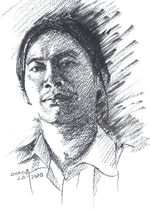During my visits to Burma this month and in June, several political observers and tycoons told me that it has been difficult to understand the military’s motives as the country transitions toward democracy. “Since they have a vested interested in the country’s business and economy, they are not going to leave soon—they will remain in power,” said a tycoon on the US sanctions list who asked to remain anonymous.
I agree without hesitation. Some former army generals have told me that they are retreating, but I see the opposite: They have maintained a grip on power for so long that they will not walk away, nor will they abandon the wealth they have accumulated. They will hold on.
It will be interesting to watch the country’s political trajectory over the next few years—especially outside the walls of Parliament, as the public becomes more involved in social and political movements. One businessman who was involved with construction projects under the former regime predicts that the opposition National League for Democracy (NLD), which has been fighting for democratic reform for a quarter century, will take more seats in the legislature. “The military leaders and government know that Daw Aung San Suu Kyi and her party will win in this coming election, and they cannot accept this as fact,” he told me, referring to the elections slated for 2015.
It’s true that the NLD’s political momentum has grown since by-elections in April last year, when the party won 43 of the 44 parliamentary seats it contested. There are rumors that on the evening election results were read, former dictator Snr-Gen Than Shwe had a meltdown while sitting with other hardline generals at his residence in Naypyidaw. He did not expect the NLD to win such a landslide victory. Some sources say he expected the opposition party to take just 25 of the 44 seats.
Since then, Burma has seen a spike in Buddhist-led nationalism and anti-Muslim riots in some major cities, with more than 200 people killed and about 150,000 displaced since clashes first broke out in June last year. Many political observers believe the military and hardline forces have played a role in instigating the riots.

Still, support remains strong for the NLD and Suu Kyi, who has expressed a desire to be the country’s next president. To achieve that goal, she faces the tough hurdle of amending the Constitution, which currently prohibits anyone from running for president if their spouse or children are foreign nationals. Suu Kyi’s late husband was British and her two sons from that marriage hold UK citizenship.
Recently, Suu Kyi asked the speaker of Burma’s Lower House of Parliament, Shwe Mann, to use his political clout to help amend the Constitution. Shwe Mann, the third-ranking general in the former military regime, has also expressed presidential ambitions and will likely be Suu Kyi’s primary competition in 2015.
What is intriguing is that Shwe Mann and Suu Kyi are getting closer. This is the talk of the town in Rangoon and Naypyidaw, where the two politicians have been seen together at several public functions, including a meeting of the Union Peacemaking Working Committee for the first time at the Myanmar Peace Center (MPC). Some observers question whether the pair has reached a political agreement ahead of the 2015 election.
At the same time, Suu Kyi seems to have distanced herself from President Thein Sein. In May, the democracy icon lashed out at his administration, which took power after elections in 2010. “The last three years have seen no tangible changes, especially in rule of law and the peace process,” she told her committee members. “If we want success in reforms, everyone involved in the process must change. Only lip-service doesn’t work.”
The president did not react. Some observers say Thein Sein, a former general who served faithfully under Than Shwe’s regime, is likely to retire when his term expires. During his recent visit to Europe, he said he was not preparing to contest the upcoming election and had “no objections” to Suu Kyi running for the presidency. “As of now, I have not prepared myself to run for the 2015 presidential election,” he told France 24 television, speaking through an interpreter.
Back in Burma, some well-informed sources believe the president and Shwe Mann have reached an agreement to allow Shwe Mann to run in the 2015 election. One tycoon told me that a message of warning has been sent to Suu Kyi regarding the Lower House speaker’s political ambitions and trustworthiness. I am sure that she listened carefully and has done her homework, but she did not respond.
Some believe Suu Kyi is putting herself in the wrong camp. Sources close to Shwe Mann have confided to me that they have concerns about the Lower House speaker. Two of his sons, Toe Naing Mann and Aung Thet Mann, are both on the US sanctions lists, with several businesses that deal in rice exports, construction and local telecoms projects. Suu Kyi is well aware of the situation and has reportedly warned them to behave themselves in order to avoid tainting their father’s reputation.
As a captor of the former regime for years, the democracy icon may have an idea of the military’s real motives, and could be calculating her strategy with this in mind. From house arrest to Parliament, she improved her ties with Thein Sein, but is now backing away, forming this new political alliance with the Lower House speaker. It’s a change in tack, and it will likely not be her last.

















